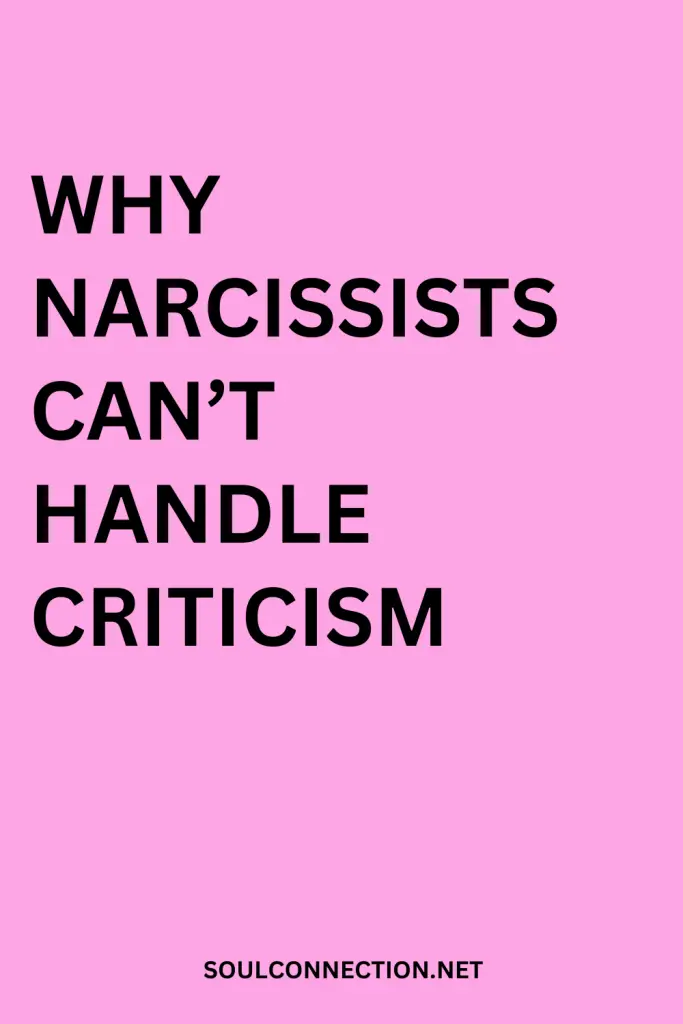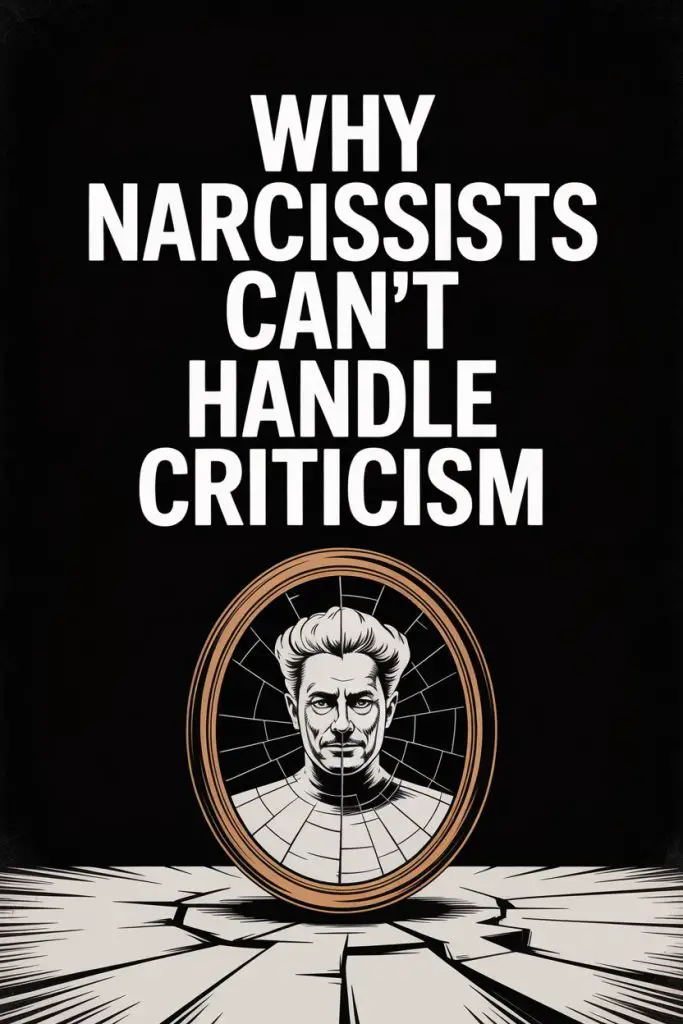Ever tried to politely point out a tiny mistake to someone, only to watch them erupt like a dodgy kettle? Welcome to the world of narcissists and criticism.
For those tangled up with a narcissist—whether romantically, professionally, or because of that cousin who can’t stop talking about his “unique perspective”—you already know: any whiff of critique is basically pressing the nuclear button.
But why is that? Why does criticism seem to send narcissists into such a tailspin?
Time to get under the hood.
The Fragile House of Mirrors
Narcissists are often painted as supremely confident, strutting about with chests puffed and egos the size of small planets. Underneath that bravado, though, sits a fragile sense of self, held together with metaphorical sticky tape.
Their self-esteem isn’t just delicate—it’s more like spun sugar in a rainstorm.
This means criticism isn’t received as simple feedback. Instead, it feels like someone’s taken a sledgehammer to the very foundation of their personality.
Even a gentle nudge about their habit of interrupting can threaten the whole illusion. When your whole identity is propped up by external validation, questioning any part of it feels catastrophic.
The Illusion of Perfection
Narcissists have an unspoken deal with themselves: “If I’m perfect, no one can hurt me.” This isn’t just a quirky personal motto; it’s a defence mechanism.
Perfection, for them, isn’t a lofty goal—it’s a shield. The catch? Perfection is impossible, and deep down, even the narcissist suspects this.
When someone dares to question their choices, skills, or even outfit, it threatens the illusion they work tirelessly to maintain. To acknowledge a mistake would mean admitting they’re not flawless—and their psyche simply can’t stomach that.
That’s why you’ll see such elaborate dodges, deflections, or outright tantrums. Admitting fault feels like inviting the enemy into the walls.
Shame: The Hidden Enemy
Criticism, for most people, stings a bit but passes. For a narcissist, it’s not just about feeling bad—it’s about drowning in a tidal wave of shame.
Shame is kryptonite for narcissists. It’s more than embarrassment; it’s the gnawing feeling that they’re fundamentally unworthy.
This shame drives much of their behaviour. If a comment triggers it, the narcissist’s first instinct isn’t reflection—it’s defense.
Cue the rage, the accusations, the classic “How dare you!” It’s all a desperate scramble to bury that shame before it surfaces.
Who’s Actually to Blame? Never the Narcissist
Ever noticed how a narcissist will twist a conversation until you’re apologising for something you didn’t do? It’s not just a party trick—it’s a survival tactic.
If criticism equals a threat to their ego, then scapegoating becomes their best mate.
Some common hits from the narcissist’s playlist:
- “You’re too sensitive.”
- “Everyone makes mistakes—why are you picking on me?”
- “If you weren’t so critical, we wouldn’t be having this problem.”
These responses flip the script, turning the critic into the villain. If the spotlight can be shifted, even for a moment, the narcissist’s fragile self-image lives to see another day.
The All-or-Nothing Trap
Nuance isn’t a narcissist’s strong suit, especially when it comes to feedback. Criticism isn’t seen as a helpful suggestion or even a single misstep—it’s a wholesale rejection of their entire being.
“You didn’t finish the report on time” somehow becomes “You’re a complete failure who never gets anything right.”
This black-and-white thinking makes even the smallest critique feel like a life-or-death situation. No wonder the response is so outsized.
If you felt your worth as a person was on the line every time someone pointed out a typo, you’d be prickly too.
How Narcissists Respond to Criticism
Defensiveness comes in many flavours. Some narcissists go for nuclear-level rage, others prefer the cold shoulder, and a select few choose a grand display of victimhood for extra dramatic effect. Expect generous servings of:
- Outright denial (“That’s not true at all!”)
- Gaslighting (“Are you sure you’re remembering that correctly?”)
- Victim-playing (“You always find fault with me—it’s not fair!”)
- Counterattacks (“Well, YOU’RE the one who should be criticised!”)
Each of these tactics shields the narcissist from having to sit with any uncomfortable emotions. It’s like emotional dodgeball, except you’re the only one playing by the rules.
The Need for Control
Control isn’t just a preference for narcissists—it’s a necessity. Maintaining control over their environment, relationships, and narrative allows them to keep that brittle self-image intact.
Criticism introduces uncertainty and puts them in a reactive position, which is deeply uncomfortable.
If you challenge a narcissist’s story, you risk destabilising their sense of order.
That’s why some will go to extraordinary lengths to reassert control, whether through intimidation, sulking, or recruiting others to their side in a classic round of “flying monkeys.”
The odds of a calm, mature conversation about your concerns? Slim.
The Roots of the Narcissistic Ego
This isn’t to excuse their behaviour, but a bit of context never hurts. Narcissistic tendencies often sprout from early experiences where love was conditional, or achievement was the golden ticket to approval.
Over time, these kids grew into adults who built impressive, but deeply vulnerable, castles in the air.
The result? Adults who are simultaneously desperate for praise and allergic to critique. At their core, they’re terrified that any slip will reveal the “unlovable” parts they tried so hard to mask.
Practical Advice for Engaging with a Narcissist
If you must offer feedback to a narcissist—whether it’s about dirty dishes or a serious relationship issue—timing and method matter. A few things to keep in mind:
- Cushion criticism with genuine positives, but don’t overdo it (they’ll see through a compliment sandwich slathered in false cheer).
- Stick to specific behaviours, not character (“When you left your socks out…” instead of “You’re always so selfish”).
- Stay calm, and don’t get sucked into the blame game—they’re looking for any excuse to shift focus off themselves.
- Set boundaries around unacceptable responses (“I’m happy to talk when we can both speak respectfully”).
- Don’t expect a magical change overnight—or ever. Your feedback might not land the way you hope, and that’s not a reflection of your delivery skills.
When all else fails, sometimes the best move is to save your energy for people who can actually listen.
Protecting Your Own Sanity
Living or working with a narcissist can feel like walking through a minefield, never sure what will set off the next explosion. It helps to remind yourself: their reaction to criticism isn’t about you.
It’s a defense against their own unaddressed wounds.
Find your allies—trusted mates, a therapist, or even an online community—who understand the unique challenges involved. Limit how often you play therapist, and give yourself permission to step back when the drama gets too much.
Your mental wellbeing isn’t a fair price for someone else’s ego.
Why Change Is So Unlikely
Narcissists rarely seek out feedback for self-improvement. After all, admitting a flaw means opening the door to vulnerability, and that risks the whole house of cards coming down.
On the rare occasion a narcissist does change, it’s usually prompted by something big—like losing a job, a partner, or having a serious wake-up call (and even then, it’s an uphill battle).
Gentle reminders, heartfelt conversations, even all-night negotiations—none of these work if the narcissist isn’t ready or willing to look in the mirror. It’s not your job to be their fixer.
Sometimes, self-preservation is the only reasonable response.
Moving Forward Without Losing Yourself
Walking on eggshells isn’t a long-term solution. Criticism—given and received well—is what helps us grow as people and partners.
If you’re stuck with someone who can’t take feedback without launching a full-scale emotional war, take stock of what you’re getting in return.
You deserve relationships where honest conversation doesn’t feel like a high-stakes gamble. Protect your boundaries, keep your expectations realistic, and don’t lose sight of your own needs in the storm of someone else’s insecurity.
Criticism isn’t poison. In the right company, it’s a lifeline.
And if you’re not getting that back? Maybe it’s time to find people who can handle a little honesty—without treating it like a personal attack from the universe itself.


